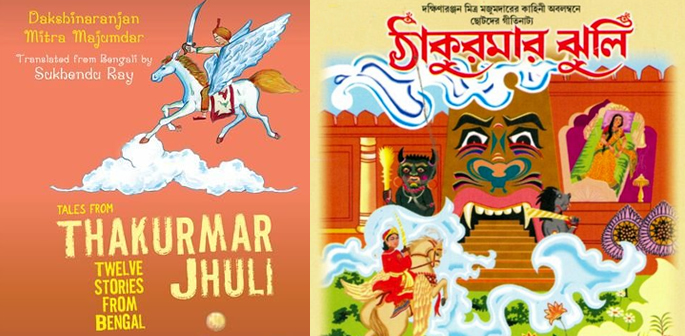It has been said, by author Dakshinaranjan Mitra that he collected these folk tales to preserve an old tradition of Bangladesh.
The treasured book Thakurmar Jhuli translates to ‘Grandmother’s Bag of Tales’. This is not an unusual title, many Bengali folk tales and stories are referred to by local people as ‘old women tales’.
People will say, “Don’t believe this, it’s just an old wives tale” or “it’s just something old women use to say”.
This is followed by the old tradition where grandparents would gather the children and tell them made up tales in South Asia.
Many of the stories consist of a faraway land, involving kings and queens, royal children, and demons. Playing with themes of good and evil, these tales often conclude with a moral lesson, making them ideal for children.
Author Dakshinaranjan Mitra has said that he collected these folk tales to preserve an old tradition of Bangladesh. He was even praised by the honourable Rabindranath Tagore in the preface, for turning these outstanding oral tales into a hard copy, reviving the creative literature of our ancestors.
We can truly say that these tales sound as beautiful in English as they do in Bengali. They were carefully translated by Sukenda Ray. From the story of the Prince, Dalim Kumar, to The Champa Brothers; we are presented with twelve stories published by Oxford Press.
DESIblitz has reviewed this book of treasures and has chosen five tales we believe are truly magical.
Neelkamal and Lalkamal
There once lived a king who lived happily with his two wives. Unbeknownst to him, one of his wives was a demon living as a human. Both queens went on to have a son each, the human son was named Kusum, whilst the demon’s son was known as Ajit. The two brothers loved each other very much and Ajit never left Kusum’s side.
However, the Demon Queen (Rakshashi Rani), did not show her step-son, Kusum, the same love. She would become overwhelmed with the urge to feast on human flesh as soon as she laid her eyes on him. Her plans to feed were disrupted by Ajit day after day as he accompanied Kusum day and night.
One night, she took both sons over to the land of demons. The Queen heartlessly took Kusum from his bed and consumed him. Ajit awoke and swung a sword at the demon. Enraged at her son’s betrayal, she devoured him too.
Much to her surprise, she regurgitated a golden egg after eating Kusum and an iron egg for Ajit. In a moment of panic, she buried the eggs at a farm.
Meanwhile, the kingdom was in ruins. Other demons had entered the land and had begun decimating everything in their path.
The following day, a farmer discovered the eggs. They hatched and from them appeared Lalkamal (Kusum) and Neelkamal (Ajit). They were dressed as the princes with crowns and all. With swords in hand, they were on a mission to destroy the demons and ogres that had overtaken the kingdom.
Were our heroes Lalkamal and Neelkamal successful or did they succumb to the demons and ogres?
This is by far one of the most loved of the Bengali tales. The heroes are children and yet somehow their bravery is unparalleled. What is even more surprising is the ruthless demon panicking and hiding the eggs. Demons are often reckless and do not care about being found out for what they have done.
Dalim Kumar
A heroic prince whose actions have been whispered through the ages; Dalim has won the hearts of every mother and girl. Dalim Kumar is known to the many as the valiant prince who flew across kingdoms on his winged horse.
His tale begins as a boy; young and with a heart so pure, playing a game of dice. The dice contains the soul of Dalim’s beloved mother, the Queen. It is concealed and soon to be in the hands of a wicked demon. The demon presents herself as a poor old woman and simply asks to see the dice.
With the dice in her possession, she casts a spell. As a result, the Queen falls unconscious and into a coma. The demon replaces the fair Queen and takes on her appearance for years. Only Dalim realises this woman is not his mother.
On a quest, by the demons might, unforeseen terror befalls Dalim. He falls off his winged horse into a foreign kingdom. Dalim goes on to save a princess from a hideous and bloodthirsty beast and then his seven brothers. He rises as a hero and becomes their king. Finally, he returns to his kingdom where he single-handedly frees his mother.
We reckon if we searched for all the princes in the lands of the fairytale, Dalim Kumar would be among the bravest.
https://www.instagram.com/p/BgrkJw2FBwU/?tagged=bengalitales
Kanchanmala and Kankanmala
To the wise, unkept promises may evoke the tale of Kanchanmala and Kankanmala. Heed this story, a thousand needles left a king in agony as a result of the unkept promises he made to his friend Rakhal. His kingdom fell to ruins and his queen was made to suffer.
One unsuspecting day, a maid offered her assistance to the Queen who had grown tired and weak from caring for her king. The maid had the best of manners and insisted that the Queen bathe in the lake. When the Queen bathed, the maid assumed her identity by wearing her attire.
She (Kankanmala) referred to the Queen (Kanchanmala) as her maid and from then began treating her like one. The King, of course, was unaware. He remained covered in needles and suffering. However, the people noticed the change in their queen. Kankanmala was unruly and vicious; she sentenced people to death over small matters.
Filled with misery, Kanchanmala made her way to a river to wash. At the river, she met an odd man who was coincidently chanting about needles. The Queen turned to him for help. She told him her woes as he followed her to the castle with his knitting material.
To see if there was any truth in the Queen’s story, he told Kankanmala about a festival where queens are required to bake cakes. He added that she should let her maid assist her. Kankanmala’s cakes were distasteful but Kanchamala’s cakes were divine. So he knew Kanchanmala was the one true Queen.
In the end, the horrid maid met her match. Her lips were sewn together with the very material the man had in his possession. The King was rid of the needles and regained his strength. The King recognized the man as his dear friend Rakhal and fulfilled his promise by making him a minister.
The concept of how pain befell both the King and the maid is part of an age-old superstition. People believed the pain of a soul would manifest into a punishment of suffering for the person responsible. To this day, some still fear being cursed or doomed to such as they believe it will come true.
Not to mention, only after the King realised his wrongdoings did the King and Queen get their happily ever after. He learned his lesson and was rewarded. In the case of Queen, we see her as a victim to the maid. As a reward for her patience, she was able to cure her husband and take back her life.
Monimala
The tale of Monimala provides a thrill. It engulfs our hearts with love and uncertainty with its many storylines. This tale is pure nostalgia. We can all recall lying awake and thinking about the concept of another world.
It all began when two friends set off on a journey to a creepy land haunted by a python. The two friends, the Prince and the Minster’s son, watched the python feast on animals as they hid on a tree top.
The Minister’s son was the bravest of the two. Strategically, he took the jewel which lit up the path and buried it to blind the pythons sight. To make short work of the python, he placed his sword above where the jewel lay. They could hear the enraged python. It began acting manically and perished from its wounds.
When daylight struck, it was confirmed that the beast was no more. Then they set out with the jewel which led them to another world where they found Princess Monimala. The Prince’s friend convinced her to marry the Prince as they had destroyed the python. She agreed.
Thus begins the second storyline, another king’s son was driven to insanity at the sight of Princess Monimala when she visited earth. An old woman captured her as the reward would allow her son to marry the King’s daughter.
Whilst the Princess and the jewel were no longer in her world, our prince fell into a deep sleep just as the snakes of the python’s world awoke. Who would be brave enough to save Monimala from her marriage to the King’s son? Will the Prince we know ever awake from his sleep?
We’ll let you find out.
This tale, like the many tales before it, presents old women as suspicious and deceitful. This is a common theme in many old and new literature. Similar running themes exist, such as people losing their minds to beings from an outside world. In particular, men becoming insane from seeing creatures such as fairies and pixies.
This spreads to the real-world where villagers speak of people who have parted from reality due to encountering something unexplainable, or a being that wishes to remain unseen from the human eye.
The Gold Wand and the Silver Wand
In a kingdom, there lived 4 troublesome young boys. Among them, there was a prince and a ministers son. They lived life like irresponsible teenagers and eventually, their fathers had enough of their behaviour. To teach them a lesson, their mothers were ordered by their husbands to serve the sons ash instead of rice.
The sons did not take kindly to this and decided to leave their homes. They began on a journey which led them to a road with four paths. Each took one road and they met with each other on the other side. They were wary, the Prince remained particularly suspicious of demons, and with good reason.
Soon, due to unforeseen circumstances, his friends had been eaten by a demon and only he was left fighting for survival. At this moment, the trees and rocks spoke to him. He sought refuge by hiding inside a mango tree. The mango tree continued aiding him as the vicious demon pursued its goal to kill him.
The demon had married a king and posed as a feeble queen. She would order the King to take her wherever her magic informed her the Prince was or would be heading to next. Even then, the Prince remained one step ahead. One day he met a princess who had the answers to how the demon could be destroyed.
She informs him that the demon can only be killed if he can find the parrot which holds her soul. Killing the parrot would mean that the demon would be no more. Once he was in possession of the parrot, the Prince made his way to the kingdom where the demon Queen ruled. He asked for an audience with the King and assured him that he had a cure for the feeble Queen.
Once she showed herself, he held out the parrot and demanded she return his friends. When she had returned his friends, he took the life of the parrot and with it he ended hers.
In this tale, giving inanimate objects such as plants a voice is interesting. In many tales, horses and plants speak to royalty, warning them of dangers and remaining loyal. It also provides these objects with significant importance. Without them, the prince would not have made the journey. For a child, we believe this teaches them to take care of lifeless objects in the same way that they would care for a human being.
These are five powerful Bengali folk tales, best told by grandmothers. They carry a lifelong meaning and provide our inner child with joy no matter how much we age. Behind each of these tales, is a reminder of the time and care our beloved grandmothers took to entertain us, just to see us smile.
We hope these tales have given you a clearer outlook regarding the difference between European and South Asian tales. We hope that you find them as impeccable and ferocious as we do.
Remember, it does not take a writer to tell a heartwarming tale. Each tale comes from a special place in the heart.


































































